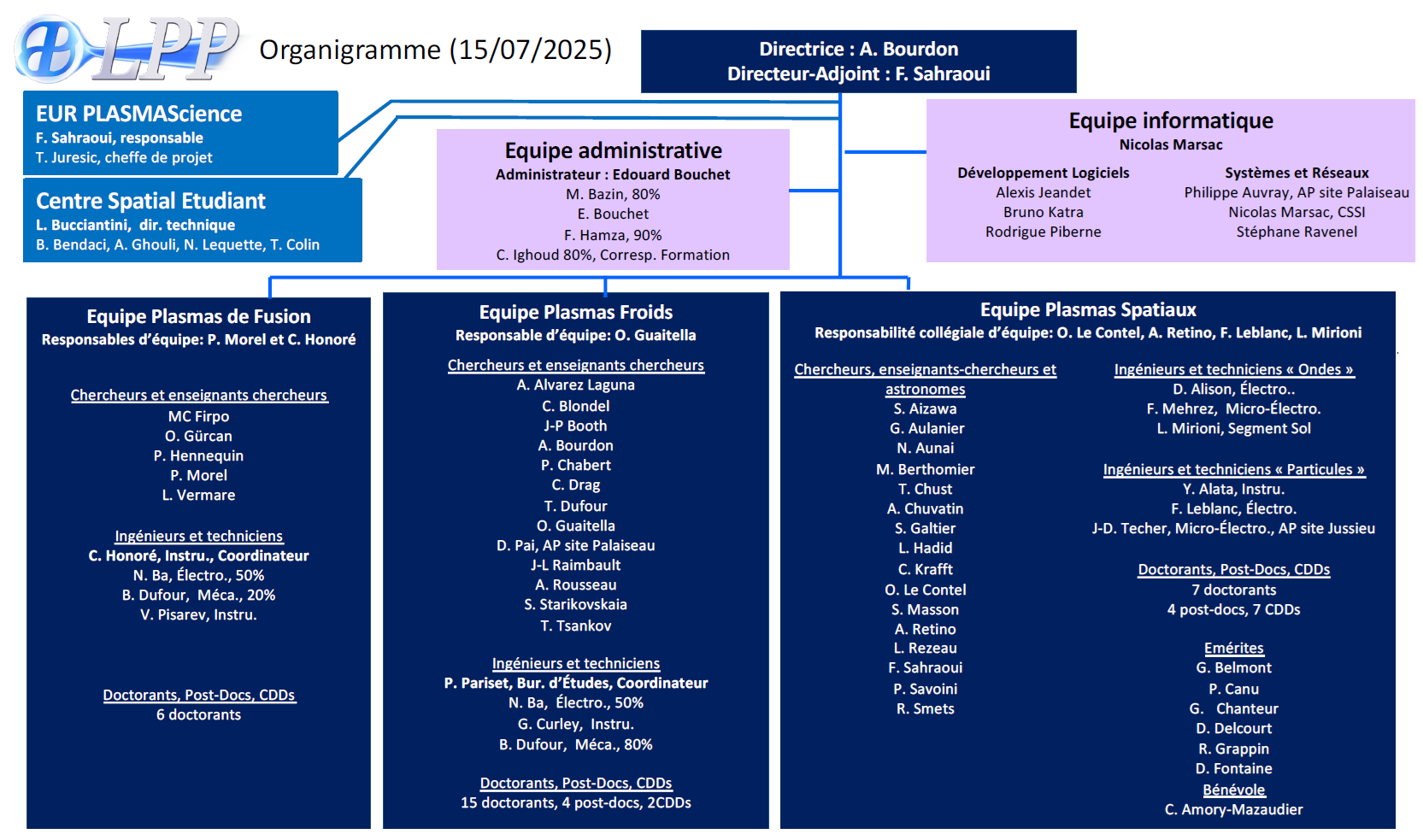Governance
Leadership
- Director: Anne Bourdon, Dr.
- Deputy Director: Fouad Sahraoui, Dr.
The leadership can be contacted at: direction@lpp.polytechnique.fr
Laboratory Council
The LPP Laboratory Council meets about six times a year (alternating between the Jussieu and Palaiseau sites) to discuss major matters of laboratory life, priorities for funding and recruitment, monitoring and execution of the budget, LPP’s positioning within its institutional environment, and any other issues proposed by laboratory members.
At LPP, a Vice-Chair is elected by the Laboratory Council from among its elected members. The Vice-Chair assists the Laboratory Director in organizing council meetings and serves as a liaison with staff. Together with the Director, the Vice-Chair prepares the Council’s agenda and co-organizes ordinary and extraordinary General Assemblies. When the agenda for a meeting is circulated, all laboratory members are invited to submit written questions to the laboratory leadership through the Vice-Chair.
From 2018 to the end of 2019, Philippe Auvray served as Vice-Chair of the Council. Since 2020, Cyrille Honoré has held this role. He helps the leadership organize council meetings and draft the minutes, and oversees the organization of elections to the Laboratory Council.
- Leadership
- Anne Bourdon
- Fouad Sahraoui
- Elected researchers / faculty members
- Nicolas Aunai
- Thierry Dufour
- Lina Hadid
- Pierre Morel
- Elected ITA staff (engineers, technicians, administrative staff)
- Nadjirou Ba
- Marilyne Bazin
- Cyrille Honoré
- Laurent Mirioni
- Elected doctoral / fixed-term contract representative
- Pierre Amadio
- Appointed members
- Jean-Paul Booth,
- Édouard Bouchet
- Olivier Guaitella
- Pascale Hennequin
- Fatima Mehrez
- Olivier Le Contel
The Laboratory Council of the Laboratoire de Physique des Plasmas (UMR 7648) calls for the abandonment of the plan to award the “Keylabs” label to certain CNRS units to the detriment of most of the others. The Council considers that such an approach would only hinder the dynamism of CNRS research units, would harm the many collaborations and exchanges among them, and would undermine the cohesion of the higher education and research community.
Motion adopted on 4 February 2025 by 10 votes in favor, 4 blank ballots (abstentions), and 1 against (15 voters out of 17).
The Laboratory Council of the Laboratoire de Physique des Plasmas (UMR 7648) expresses its support for the mobilization seeking the withdrawal of the pension reform bill which, if adopted, would lead to a generalized reduction in pensions—particularly for women—further worsening the living conditions of a very large share of the population.
It also wishes to express its opposition to the current draft Research Programming Law (“LPPR”), which relies on increased use of temporary contractual recruitments (“tenure track,” CDI de mission—project-based open-ended contracts) and project-based funding, instead of a multi-year plan for recruitment to permanent statutory positions in higher education and research and an increase in laboratories’ recurrent budgets. It expresses its support for the motion concerning the expected provisions of the LPPR adopted by the Conference of Presidents of the National Committee (CPCN) for scientific research on 17 January 2020 (https://www.cnrs.fr/comitenational/struc_coord/cpcn/motions/200117_Motion_LPPR_vf.pdf).
Finally, it supports calls to take part in the general assemblies organized on the various higher education and research campuses and in national days of mobilization.
The motion was adopted on Friday, 28 February, by 11 votes in favor, 0 against, 2 abstentions, and 5 members who did not take part in the vote.
The LPP “space plasmas” team has built over several decades a world-unique expertise in the detection of charged particles. Today, it plays a key role in the “plasma” instruments of missions currently under development—BepiColombo and Solar Orbiter. It is also involved in preparing future missions such as JUICE, and takes an active part in the Research and Technology program of the French Space Agency (CNES).
Nevertheless, following departures that were not replaced, its “particles” component now consists of only three permanent research engineers, each of whom has had to take on activities outside his or her core competencies in order to preserve these instrumental developments at LPP.
Recognizing the team’s structural need for a versatile mid-level engineer position, CNRS-INSU granted LPP, at the time of its creation in early 2009, a fixed-term engineer position (CDD IE) held by Mr. Lelgouarch for nearly four years, with the prospect of opening a permanent position in the short term. The LPP Laboratory Council deeply regrets that the extremely limited number of CNRS openings in 2013 does not allow the team’s situation to be stabilized—something that would undeniably be achieved by recruiting Mr. Lelgouarch.
The LPP Laboratory Council wishes to alert its supervising authorities that non-renewal of Mr. Lelgouarch’s fixed-term contract on 1 February 2013 would wipe out the team’s long-term investment in training Mr. Lelgouarch and in preparing space instrumentation for future missions. These are cutting-edge techniques and unique know-how that are not taught in academic programs, but patiently developed and passed on over the course of instrument development within international collaborations. In line with the conclusions of the Inter-Agency Solar Orbiter Committee of 23 January 2012, we recommend extending Mr. Lelgouarch’s fixed-term contract and opening a competitive recruitment (“concours”), which would represent the culmination of the transmission efforts invested by the LPP technical team to train Mr. Lelgouarch and to fulfill LPP’s commitments on missions under development.
Failing this, the LPP Laboratory Council notes the negative signal that would be sent by its supervising bodies to LPP’s technical and scientific teams, and also to the young PhDs, engineers and technians trained in our laboratory, who—ab a genuine employment policy in space research—would inevitably leave this field.
Motion adopted on 19 December 2012 by 10 votes in favor, 0 against, and 2 abstentions.
The LPP Laboratory Council recalls that, under the “Tron protocol” adopted in March 2011 concerning the securing of career paths for fixed-term public-sector employees, staff on fixed-term contracts (CDD) may obtain stable employment under certain conditions. This agreement is to be followed by a law to be adopted in early 2012.
In particular, the LPP Laboratory Council strongly recommends that Mr. Lelgouarch’s fixed-term contract be extended for at least six months so that he may, if applicable, benefit from the forthcoming law on securing career paths, or be in a good position to apply for an external competitive recruitment examination (“concours”) that may be opened in 2012.
The LPP Laboratory Council emphasizes that Mr. Lelgouarch has been employed at LPP for three years on a CNRS fixed-term position created by INSU pending the opening of a competitive recruitment. Mr. Lelgouarch is fully integrated into his team, has consistently carried out the tasks assigned to him, and has always expressed his wish to join our laboratory in a permanent position. Over these three years, he has been trained in the specific features of space-instrumentation techniques by more experienced LPP colleagues and has thus acquired a high level of expertise in this field.
Motion adopted on 30 November 2011 by 15 votes in favor, 0 against, and 5 abstentions.






